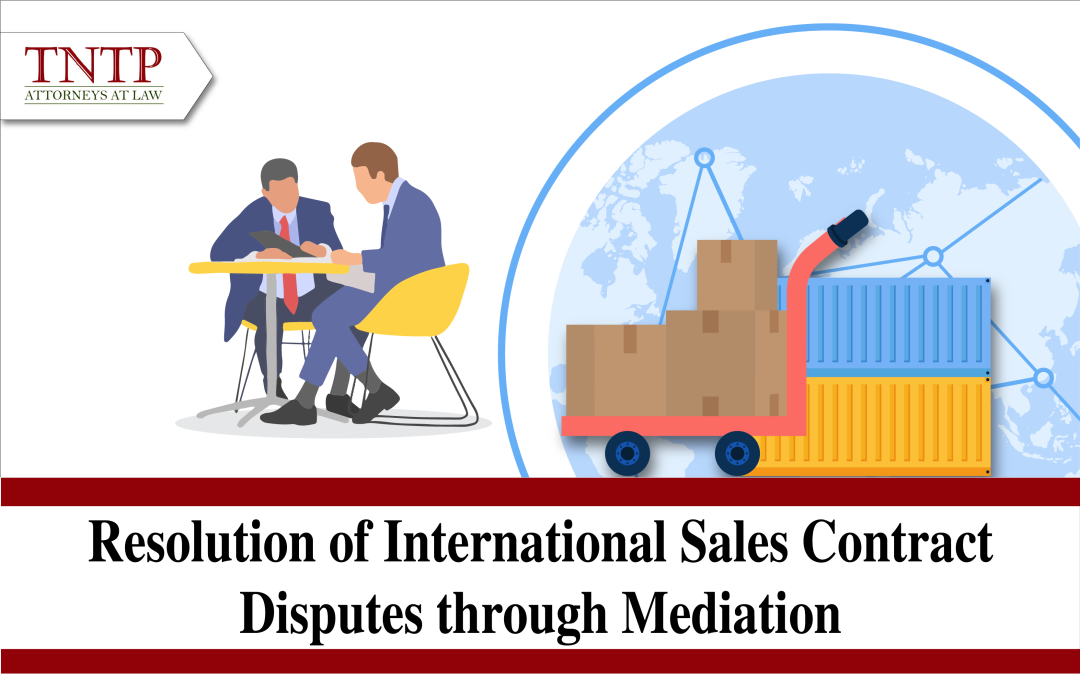In the context of increasing international integration, disputes related to international sales contracts are becoming more frequent. Mediation can be applied as a preferred method to resolve these disputes effectively due to its flexibility, speed, cost-efficiency, and ability to maintain and protect the business relationship between the parties. In this article, TNTP will present our esteemed readers with basic knowledge of mediation in resolving disputes related to international sales contracts.
1. Definition of Mediation
Mediation is a negotiation conducted with the assistance of a third party (the third party is not involved in the negotiation). It is an independent dispute resolution method outside of court or arbitration. The mediator is the third party chosen by the disputing parties to assist in resolving the conflict. The parties can select either a single mediator or a mediation panel consisting of multiple mediators. During the mediation process, the mediator or the mediation panel listens, analyzes, and explains unclear or unresolved issues between the parties, suggests optimal solutions to resolve the dispute, and assists the parties in drafting a settlement agreement if they are resolved.
2. Classification
Mediation is classified into two types:
• Ad hoc Mediation
In ad hoc mediation, the disputing parties independently select any third party to act as the mediator. The parties are free to mutually negotiate on establishing mediation procedures or choose mediation rules provided by Mediation Centers.
• Institutional Mediation
Institutional mediation is conducted through a specific mediation organization chosen by the parties. This organization operates regularly with its charter, operational regulations, and mediation rules. Additionally, these organizations have management bodies, administrative departments, and secretariats to support the mediation process.
3. Characteristics of Mediation in Resolving Disputes in International Sales Contracts
• Mediation is only conducted when the parties have a mediation agreement
A mediation agreement can be a clause in the international sales contract or a separate agreement. The mediation agreement may be made before the contract is signed, during the performance of the contract, or after a dispute has arisen. The parties can refer to the sample mediation clause of the Vietnam Mediation Center (VMC).
• The mediator’s role is solely to assist the parties in resolving the dispute
In mediation, the likelihood of resolving the dispute depends heavily on the trust the parties have in the mediator. The mediator assists by raising issues neutrally and objectively without rendering a judgment. The mediator’s recommendations and support are only persuasive if the mediator has a deep understanding of the dispute’s subject matter, helping the parties fully comprehend the remaining conflicts and their impacts. If the parties reach a successful settlement, the settlement agreement reflects the content agreed upon by the parties, not the mediator’s opinion.
• Flexible mediation procedures
The parties are free to agree on the mediation procedures and can modify them at any time.
• High confidentiality
To encourage openness during mediation, all information shared during the mediation process is kept confidential and cannot be used as evidence in court or arbitration proceedings, except in certain special cases.
• Enforcement of the outcome
Upon conciliation is successful, results in a dispute resolution plan agreed upon by the parties, this agreement is considered a new contract between the parties and is voluntarily enforceable. To enhance the effectiveness of mediation, the law provides for the recognition of successful mediation agreements under civil procedure regulations. A successful conciliation has been recognized by the court with a legally binding decision, and the parties may request the enforcement agency to execute the decision in the same manner as other court judgments or decisions.
4. UNCITRAL Mediation Rules and Model Law on International Commercial Mediation of UNCITRAL
UNCITRAL has consistently prioritized the development of alternative dispute resolution methods, such as mediation, as a key issue. To establish a unified legal framework for parties participating in mediation procedures worldwide, UNCITRAL developed the Mediation Rules in 1980 and the Model Law on International Commercial Mediation in 2002.
• UNCITRAL Mediation Rules
The UNCITRAL Mediation Rules cover the following key points:
– Emphasis on freedom and voluntariness at all stages of the mediation process;
– Mediators must act independently and impartially, adhering to the principles of objectivity, fairness, and justice;
– The use of arbitration or court procedures while mediation is ongoing is not encouraged.
• UNCITRAL Model Law
The Model Law on Mediation was largely based on the provisions of the Mediation Rules. The basic aspects of mediation covered by the Model Law include:
– Initiation of mediation procedures;
– Agreed methods for conducting mediation;
– Selection/appointment of mediators;
– Information sharing;
– Confidentiality of information;
– Use of evidence;
– Termination of the mediation process.
The above is TNTP’s article titled “Resolving International Sales Contract Disputes Through Mediation” presented to our esteemed readers.
Sincerely,








